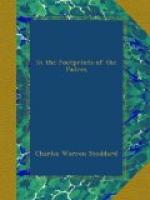After the heavy and regular breathing had set in—I think all slept save myself—light footsteps were heard without. Why should one turn a key in a bungalow whose hospitality is only limited by the boundary line of the county surveyor? Our keys were not turned, in fact,—too late—we discovered there were no keys to turn. In the dim darkness—the moon lent us little aid at the moment—our door was softly thrown open, and the splash of fountains could be heard; it was the sound of many waters. As I listened to it in a half dream, it fell upon my ear most musically, and then it fell upon my nose, and eyes, and mouth; it seemed as if the windows of heaven were opened, as if the dreadful deluge had come again. I soon discovered what it was. I threw the damp bed clothes over my head and awaited further developments. I began to think they never would come—I mean the developments. Meanwhile the garden hose, in the hands of the irate maidens, played briskly upon the four quarters of the room—not a bed escaped the furious stream. Nothing was left that was not saturated and soaked, sponge-full. The floor ran torrents; our boots floated away upon the mimic tide. We lay like inundated mummies, but spake never a word. Possibly the girls thought we were drowned; at all events, they withdrew in consternation, leaving the hose so that it still belched its unwelcome waters into the very centre of our drenched apartment.
Rising at last from our clammy shrouds, we gave chase; but the water-nymphs had fled. Then we barricaded the bungalow, and held a council of war. Sitting in moist conclave, we were again assailed and driven back to our rooms, which might now be likened to a swimming bath at low-tide. We shrieked for stimulants, but were stoutly denied, and then we took to the woods in a fit of indignation, bordering closely upon a state of nature.
I thought to bury myself in the trackless wild; to end my days in the depths of the primeval forest. But I remembered how a tiger-cat had been lately seen emerging from these otherwise alluring haunts, and returned at once to the open, where I glistened in the moonlight, now radiant, and shivered at the thought of the possible snakes coiling about my feet. My disgust of life was full; yet in the midst of it I saw the reviving flames dancing upon the hearth-stone, and the click of glasses recalled me to my senses.
We returned in a body, a defeated brotherhood, accepting as a peace-offering such life-giving draughts as compelled us, almost against our will, to drink to the very dregs in token of full surrender. Then rheumatism and I lay down together, and a little child might have played with any two of us. I assured my miserable companions that “I was not accustomed to such treatment.” Alf added that “it was more than he had bargained for.” Bartholomew had neither speech nor language wherewith to vent his spleen. As for the bland and blooming Croesus—he who had been lapped in luxury and cradled in delight—it was his private opinion, publicly expressed, that “the like of it was unknown in the annals of social history.”




